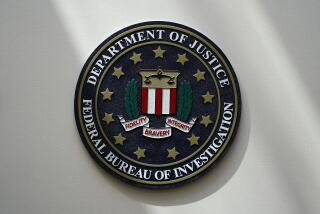Sheik’s Illness Delays Bombing Plot Trial : New York: Muslim cleric and 11 other defendants are accused of a terrorist conspiracy as part of a U.S. jihad. Court date is moved to January.
NEW YORK — A federal judge on Monday postponed until early January the trial of Sheik Omar Abdel Rahman and 11 other defendants charged with plotting a war of urban terrorism, because the blind Egyptian cleric remains hospitalized with pneumonia.
Defense lawyers said they expected Abdel Rahman, 56, who is diabetic and has heart disease, to return to his cell by the end of the week but that he would be too weak to stand trial.
“I don’t have any choice,” Judge Michael B. Mukasey said, postponing jury selection until Jan. 9.
According to a 100-page memorandum opposing defendants’ pretrial motions, the government contends that as early as 1989, an Islamic jihad organization existed in the United States which trained for, planned and carried out terrorist acts in New York, including the World Trade Center bombing in February, 1993, and the assassination of Rabbi Meir Kahane, founder of the militant Jewish Defense League, in 1990.
Prosecutors charge that Abdel Rahman became the leader of the U.S. jihad and “played a key role both in articulating and defining” its organization and acts. When the trial begins, the government will argue that the sheik “provided necessary counsel” on whether acts of terrorism “were permissible or forbidden under his radical interpretation of Islamic law.”
Prosecutors also plan to introduce evidence that the killing of Kahane immediately after his speech at the Marriott East Side Hotel on Nov. 5, 1990, was planned and carried out to further the aims of the jihad.
The government will charge that El Sayyid Nosair shot Kahane and was assisted by other members of a jihad and that the fingerprints of Mohammed A. Salameh and Nidal Ayyad, two of the defendants convicted of bombing the World Trade Center, were found in Nosair’s car, which was abandoned in a no-parking zone near the hotel.
The court papers also charge that Mahmud Abouhalima, a third Trade Center defendant who was found guilty, “was the intended getaway driver and failed to station himself properly for the anticipated rendezvous with Nosair.”
A New York state jury acquitted Nosair of murder but convicted him of weapon charges. Prosecutors charge members of the jihad planned political kidnapings in an effort to free Nosair from the state prison where he is serving more than 20 years. He is one of the defendants in the upcoming federal trial.
Prosecutors charged that Nosair organized paramilitary training for jihad members both in the United States and overseas. After his arrest, court papers charge that Nosair continued to consult with other jihad members about acts of terrorism.
Abdel Rahman has been in prison for more than a year. Prosecutors say the targets of the conspiracy included the United Nations, two tunnels linking New York with New Jersey and the federal building housing the Manhattan field office of the FBI.
Defense lawyers on Monday tried to have an alleged conversation between the sheik and Emad Ali Salem striken from evidence. Salem was the sheik’s bodyguard and is now the government’s chief informant in the case.
According to court papers, Salem asked Abdel Rahman what he thought about the plan to bomb the federal building. When Salem indicated that the plan was in motion, the cleric allegedy responded: “It doesn’t matter. Slow down. Slow down a little bit. The one who killed Kennedy was trained for three years.”
Lawyers in the case say the reference apparently is to Sirhan Sirhan, the Jordanian immigrant who assassinated Sen. Robert F. Kennedy while he was campaigning in Los Angeles for the presidency in 1968.
The defendants also are charged with planning to kill Egyptian President Hosni Mubarak during a trip to New York to address the United Nations.
“The evidence the government seeks to introduce in connection with the Kahane homicide and the Mubarak murder plot is directly relevant proof that the defendants were members of a terrorist conspiracy which viewed the West as a monolithic enemy, under the direction of the United States, that oppressed Muslims and was a lifeline to Israel and Zionists,” prosecutors said in the memorandum.
The memorandum further charged that the agreement to “wage war” against the United States was “fully operational before the Kahane homicide.”
“The attack on Rabbi Kahane did not occur in a vacuum,” prosecutors said. “It was a small, albeit brutal, step in a terrorist campaign which comprehended not only assassinations of individuals but the mass destruction of political, social and economic assets of the ‘infidel’ West, of which the United States was deemed the leader.”
More to Read
Sign up for Essential California
The most important California stories and recommendations in your inbox every morning.
You may occasionally receive promotional content from the Los Angeles Times.










